2013年CATTI三级笔译实务真题
CATTI三级笔译综合能力真题试卷及答案解析.doc
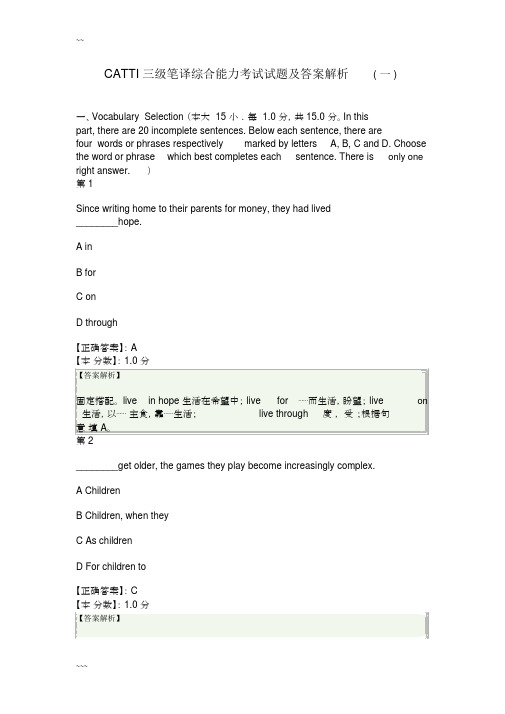
进入画廊的。C.permission许可,允许,后常接动词不定式。
第Hale Waihona Puke 题I''m so tired that I can''t take ________what you''re saying.
Acommon
Bgeneral
Cstaple
Dpopular
【正确答案】:C
【本题分数】:1.0分
~~~
~~
【答案解析】
近 辨析。A.common共同的,共有的;普通的,常 的;主要指共有的或共同
享受的;B.general一般的,普通的,全面的;主要指普遍性;C.staple主要
的,常用的;staplefood指主食;D.popular通俗的,流行的;因此答案C。
第5题
All students have free________to the library.
A passageway
~~~
~~
Bentrance
Cpermission
Daccess
【正确答案】:D
【本题分数】:1.0分
【答案解析】
固定搭配。have access to得以接近(或进入),享有机会。而A.passageway过道,出入口;B.entrance入口,进入;如:Police have not yet explained
the word or phrasewhich best completes eachsentence. There isonly one
right answer.)
翻译资料 CATTI三级笔译汉译英真题
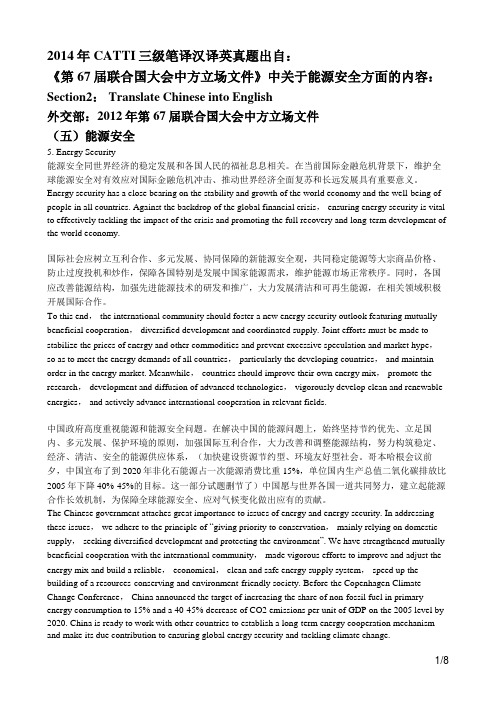
2014年CATTI三级笔译汉译英真题出自:《第67届联合国大会中方立场文件》中关于能源安全方面的内容:Section2:Translate Chinese into English外交部:2012年第67届联合国大会中方立场文件(五)能源安全5. Energy Security能源安全同世界经济的稳定发展和各国人民的福祉息息相关。
在当前国际金融危机背景下,维护全球能源安全对有效应对国际金融危机冲击、推动世界经济全面复苏和长远发展具有重要意义。
Energy security has a close bearing on the stability and growth of the world economy and the well-being of people in all countries. Against the backdrop of the global financial crisis,ensuring energy security is vital to effectively tackling the impact of the crisis and promoting the full recovery and long-term development of the world economy.国际社会应树立互利合作、多元发展、协同保障的新能源安全观,共同稳定能源等大宗商品价格、防止过度投机和炒作,保障各国特别是发展中国家能源需求,维护能源市场正常秩序。
同时,各国应改善能源结构,加强先进能源技术的研发和推广,大力发展清洁和可再生能源,在相关领域积极开展国际合作。
To this end,the international community should foster a new energy security outlook featuring mutually beneficial cooperation,diversified development and coordinated supply. Joint efforts must be made to stabilize the prices of energy and other commodities and prevent excessive speculation and market hype,so as to meet the energy demands of all countries,particularly the developing countries,and maintain order in the energy market. Meanwhile,countries should improve their own energy mix,promote the research,development and diffusion of advanced technologies,vigorously develop clean and renewable energies,and actively advance international cooperation in relevant fields.中国政府高度重视能源和能源安全问题。
CATTI三级笔译综合能力真题及答案解析

CATTI三级笔译综合能力考试试题及答案解析(一)一、Vocabulary Selection(本大题15小题.每题1.0分,共15.0分。
In this part, there are 20 incomplete sentences. Below each sentence, there are four words or phrases respectively marked by letters A, B, C and D. Choose the word or phrase which best completes each sentence. There is only one right answer. )第1题Since writing home to their parents for money, they had lived________hope.A inB forC onD through【正确答案】:A【本题分数】:1.0分【答案解析】固定搭配。
live in hope生活在希望中;live for为……而生活,盼望;live on 继续生活,以……为主食,靠……生活;live through度过,经受过;根据句意应填A。
第2题________get older, the games they play become increasingly complex.A ChildrenB Children, when theyC As childrenD For children to【正确答案】:C【本题分数】:1.0分【答案解析】语法应用。
本句逗号前是状语从句,空白处应填连词;主句主语是the games,因此选项A、B、D均不对;只有as“随着”符合句意,所以C为答案。
第3题Martin has created enough memorable ________to make it easy to forgive his lows.A youngstersB noblesC highsD miserables【正确答案】:C【本题分数】:1.0分【答案解析】固定搭配。
2004-2013CATTI笔译实务三级参考答案(FREE)

参考译文2004.5按照法律规定,在英格兰、苏格兰和威尔士,家长一定要使自己的孩子在5岁至16岁期间在学校或其它地方接受全日制教育,在北爱尔兰则为4岁至16岁。
大约93%的学生享受公家提供经费的免费教育,其他学生上独立学校,这种学校靠学生家长缴费来筹措经费。
许多三、四岁的孩子上幼儿园和幼儿班(在英格兰还有小学校里的小班)。
某些民办的日托幼儿园和学前游戏小组(大都是家长组织的)也提供学前教育。
政府已作出承诺,要大力发展学前教育,使所有的儿童在开始上学的时候在识字和识数方面都有一点基础。
在英格兰和威尔土,政府从1998年9月开始为所有4岁的孩子提供免费幼儿教育,如果他们的父母需要的话。
政府还承诺,随后要分阶段实现为三岁的孩子提供免费幼儿教育的目标。
为达到这些目标,地方教育当局与民间志愿办学者合作,已制定出“早期教育发展计划”。
制订这类计划意在表明民办幼儿园、游戏小组和学校可以怎样通过合作来最好地为孩子和家长服务。
从1999年4月起,早期教育发展组织和发展计划将扩大范围,以提供与早期教育相结合的优良的儿童保健。
此外,政府还在英格兰与地方当局以及其它部门合作建立“优秀早期教育中心”,以展示教育与儿童保健方面的好的做法。
在苏格兰,地方教育当局一直领导这方面的工作。
1998年8月以来,他们与民间志愿办学者合作,进行规划,协调学前教育,提供更多名额。
政府计划在1998年冬季前使所有的儿童在上学前一年享受到良好的非全日制教育。
北爱尔兰义务教育入学年龄较低,为4岁,每年9月学生按统一日期入学。
一项由教育局与图书馆管理局、其它法定办学单位和民间志愿办学者联合执行的学前教育发展计划已经增加了学前教育学生的名额。
It isn't often that one has the chance to congratulate a noted woman writer on her 80th birthday. So on October 5 last year, when I went to Bing Xin's house, I felt very excited. I explained that I hoped she would tell me something about how she became a poet. "I haven't written poetry for many years," she said smiling. "But I still love to read good poetry."Bing Xin was fortunate to have parents who encouraged her to study and write. When she was attending a women's college in Beijing in 1919, an event occurred which changed the whole course of her life. That was the May 4th Movement, a patriotic democratic movement started by students in Beijing. The mass demonstrations made a deep impression on her. She threw herself into the struggle and was put in charge of publicity by the Student Union. She wrote poems, articles and stories, attacking imperialism and feudalism in its various forms.Going to the U.S. in 1923 to study literature, she wrote down her impressions on the way and during her stay there. These were published in the collection To Little Readers. The book brought her instant fame, not only because she was a woman writer, but also because of the noble sentiments in the book. Quite a few younger writers say it was Bing Xin's writings that started them on the road they have since followed.2004.11几个星期前,我问一个14岁的朋友,在学校的学习情况。
CATTI英语三级翻译考试笔译实务训练题
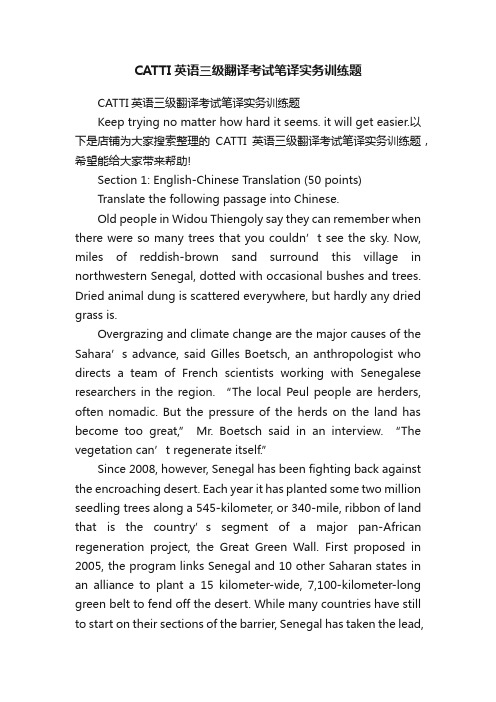
CATTI英语三级翻译考试笔译实务训练题CATTI英语三级翻译考试笔译实务训练题Keep trying no matter how hard it seems. it will get easier.以下是店铺为大家搜索整理的CATTI英语三级翻译考试笔译实务训练题,希望能给大家带来帮助!Section 1: English-Chinese Translation (50 points)Translate the following passage into Chinese.Old people in Widou Thiengoly say they can remember when there were so many trees that you couldn’t see the sky. Now, miles of reddish-brown sand surround this village in northwestern Senegal, dotted with occasional bushes and trees. Dried animal dung is scattered everywhere, but hardly any dried grass is.Overgrazing and climate change are the major causes of the Sahara’s advance, said Gilles Boetsch, an anthropologist who directs a team of French scientists working with Senegalese researchers in the region. “The local Peul people are herders, often nomadic. But the pressure of the herds on the land has become too great,” Mr. Boetsch said in an interview. “The vegetation can’t regenerate itself.”Since 2008, however, Senegal has been fighting back against the encroaching desert. Each year it has planted some two million seedling trees along a 545-kilometer, or 340-mile, ribbon of land that is the country’s segment of a major pan-African regeneration project, the Great Green Wall. First proposed in 2005, the program links Senegal and 10 other Saharan states in an alliance to plant a 15 kilometer-wide, 7,100-kilometer-long green belt to fend off the desert. While many countries have still to start on their sections of the barrier, Senegal has taken the lead,with the creation of a National Agency for the Great Green Wall.“This semi-arid region is becoming less and less habitable. We want to make it possible for people to continue to live here,” Col. Pap Sarr, the agency’s technical director, said in an interview here. Colonel Sarr has forged working alliances between Senegalese researchers and the French team headed by Mr. Boetsch, in fields as varied as soil microbiology, ecology, medicine an d anthropology. “In Senegal we hope to experiment with different ways of doing things that will benefit the other countries as they become more active,” the colonel said. Each year since 2008, from May to June, about 400 people are employed in eight nurseries, choosing and overseeing germination of seeds and tending the seedlings until they are ready for planting. In August, 1,000 people are mobilized to plant out rows of seedlings, about 2 million plants, allowing them a full two months of the rainy season to take root before the long, dry season sets in.After their first dry season, the saplings look dead, brown twigs sticking out of holes in the ground, but 80 percent survive. Six years on, trees planted in 2008 are up to three meters, or 10 feet, tall. So far, 30,000 hectares, or about 75,000 acres, have been planted, including 4,000 hectares this summer. There are already discernible impacts on the microclimate, said Jean-Luc Peiry, a physical geography professor at the Université Blaise Pascal in Clermont-Ferrand, France, who has placed 30 sensors to record temperatures in some planted parcels.“Preliminary results show that clumps of four to eight small trees can have an important impact on temperature,” Professor Peiry said in an interview. “The trans piration of the trees creates a microclimate that moderates daily temperature extremes.”“The trees also have an important role in slowing the soil erosion caused by the wind, reducing the dust, and acting like a large rough doormat, halting the sand-laden winds from the Sahara,” he added. Wildlife is responding to the changes. “Migratory birds are reappearing,” Mr. Boetsch said.The project uses eight groundwater pumping stations built in 1954, before Senegal achieved its independence from France in 1960. The pumps fill giant basins that provide water for animals, tree nurseries and gardens where fruit and vegetables are grown.Section 2: Chinese-English Translation (50 points)Translate the following passage into English.健康是促进人的全面发展的必然要求。
全国翻译三级真题版
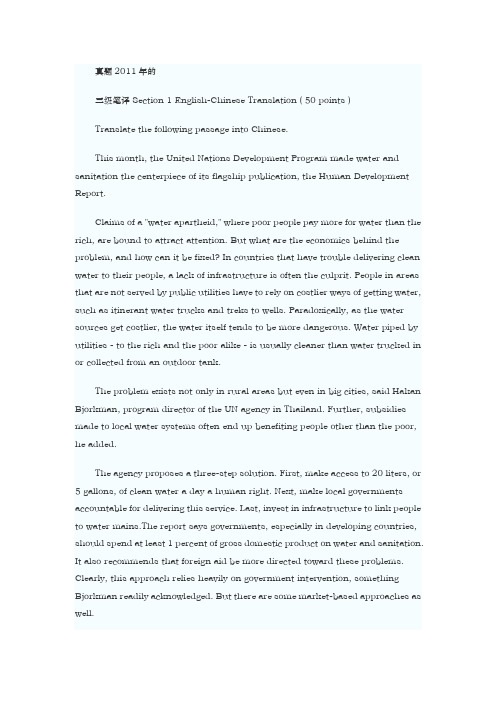
真题2011年的三级笔译Section 1 English-Chinese Translation ( 50 points )Translate the following passage into Chinese.This month, the United Nations Development Program made water and sanitation the centerpiece of its flagship publication, the Human Development Report.Claims of a "water apartheid," where poor people pay more for water than the rich, are bound to attract attention. But what are the economics behind the problem, and how can it be fixed? In countries that have trouble delivering clean water to their people, a lack of infrastructure is often the culprit. People in areas that are not served by public utilities have to rely on costlier ways of getting water, such as itinerant water trucks and treks to wells. Paradoxically, as the water sources get costlier, the water itself tends to be more dangerous. Water piped by utilities - to the rich and the poor alike - is usually cleaner than water trucked in or collected from an outdoor tank.The problem exists not only in rural areas but even in big cities, said Hakan Bjorkman, program director of the UN agency in Thailand. Further, subsidies made to local water systems often end up benefiting people other than the poor, he added.The agency proposes a three-step solution. First, make access to 20 liters, or 5 gallons, of clean water a day a human right. Next, make local governments accountable for delivering this service. Last, invest in infrastructure to link people to water mains.The report says governments, especially in developing countries, should spend at least 1 percent of gross domestic product on water and sanitation. It also recommends that foreign aid be more directed toward these problems. Clearly, this approach relies heavily on government intervention, something Bjorkman readily acknowledged. But there are some market-based approaches as well.By offering cut-rate connections to poor people to the water mainline, the private water utility in Abidjan, Ivory Coast, has steadily increased access to clean water, according to the agency's report. A subsidy may not even be necessary, despite the agency's proposals, if a country can harness the economic benefits of providing clean water.People who receive clean water are much less likely to die from water-borne diseases - a common malady in the developing world - and much more likely to enjoy long, productive, taxpaying lives that can benefit their host countries. So if a government is trying to raise financing to invest in new infrastructure, it might find receptive ears in private credit markets - as long as it can harness the return. Similarly, private companies may calculate that it is worth bringing clean water to an area if its residents are willing to pay back the investment over many years.In the meantime, some local solutions are being found. In Thailand, Bjorkman said, some small communities are taking challenges like water access upon themselves. "People organize themselves in groups to leverage what little resources they have to help their communities," he said. "That's especially true out in the rural areas. They invest their money in revolving funds and saving schemes, and they invest themselves to improve their villages. "It is not always easy to take these solutions and replicate them in other countries, though. Assembling a broad menu of different approaches can be the first step in finding the right solution for a given region or country.出处:.nytimes./2006/11/14/business/worldbusiness/14iht-glob15.3535740.htmlSection 2 Chinese-English Translation ( 50 points )Translate the following passage into English.即使遇到丰收年景,对中国来说,要用世界百分之七的耕地养活全球五分之一的人口仍是一项艰巨的任务。
2013-2016+年+11+月CATTI+英语三级笔译实务试题+
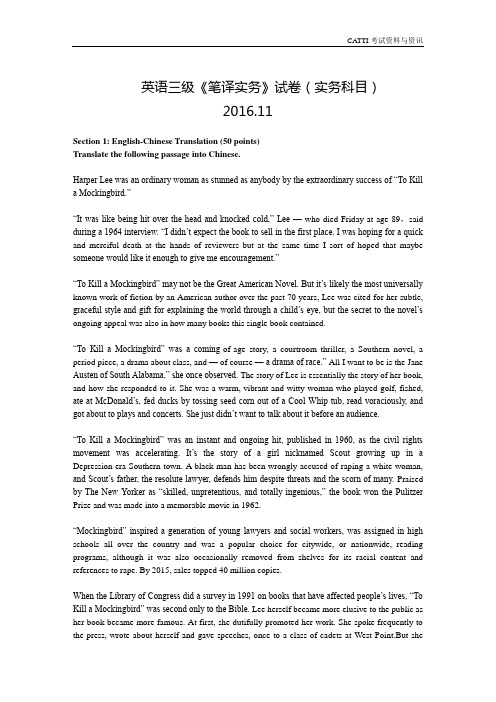
英语三级《笔译实务》试卷(实务科目)2016.11Section 1: English-Chinese Translation (50 points)Translate the following passage into Chinese.Harper Lee was an ordinary woman as stunned as anybody by the extraordinary success of “To Kill a Mockingbird.”“It was like being hit over the head and knocked cold,” Lee — who died Friday at age 89,said during a 1964 interview. “I didn’t expect the book to sell in the first place. I was hoping for a quick and merciful death at the hands of reviewers but at the same time I sort of hoped that maybe someone would like it enough to give me encouragement.”“To Kill a Mockingbird” may not be the Great American Novel. But it’s likely the most universally known work of fiction by an American author over the past 70 years, Lee was cited for her subtle, graceful style and gift for explaining the world through a child’s eye, but the secret to the novel’s ongoing appeal was also in how many books this single book contained.“To Kill a Mockingbird” was a coming-of-age story, a courtroom thriller, a Southern novel, a period piece, a drama about class, and — of course —a drama of race.” All I want to be is the Jane Austen of South Alabama,” she once observed. The story of Lee is essentially the story of her book, and how she responded to it. She was a warm, vibrant and witty woman who played golf, fished, ate at McDonald’s, fed ducks by tossing seed corn out of a Cool Whip tub, read voraciously, and got about to plays and concerts. She just didn’t want to talk about it before an audience.“To Kill a Mockingbird” was an instant and ongoing hit, published in 1960, as the civil rights movement was accelerating. It’s the story of a girl nicknamed Scout growing up in a Depression-era Southern town. A black man has been wrongly accused of raping a white woman, and Scout’s father, the resolute lawyer, defends him despite threats and the scorn of many. Praised by The New Yorker as “skilled, unpretentious, and totally ingenious,” the book won the Pulitzer Prize and was made into a memorable movie in 1962.“Mockingbird” inspired a generation of young lawyers and social workers, was assigned in high schools all over the country and was a popular choice for citywide, or nationwide, reading programs, although it was also occasionally removed from shelves for its racial content and references to rape. By 2015, sales topped 40 million copies.When the Library of Congress did a survey in 1991 on books that have affected people’s lives, “To Kill a Mockingbird” was second only to the Bible. Lee herself became more elusive to the public as her book became more famous. At first, she dutifully promoted her work. She spoke frequently to the press, wrote about herself and gave speeches, once to a class of cadets at West Point.But shebegan declining interviews in the mid-1960s and, until late in her life, firmly avoided making any public comment about her novel or her career.Her novel, while hugely popular, was not ranked by many scholars in the same category as the work of other Southern authors Decades after its publication, little was written about it in scholarly journals. Some critics have called the book naive and sentimental, whether dismissing the Ku Klux Klan as a minor nuisance or advocating change through personal persuasion rather than collective action.Section 2: Chinese-English Translation (50 points)Translate the following passage into English.本公司是一家大型国有房地产上市公司,国家一级房地产开发资质企业,连续五年荣膺中国房地产行业领导公司品牌。
2013年-2017年CATTI英语三级笔译实务真题与答案附送备考经验2019年新编
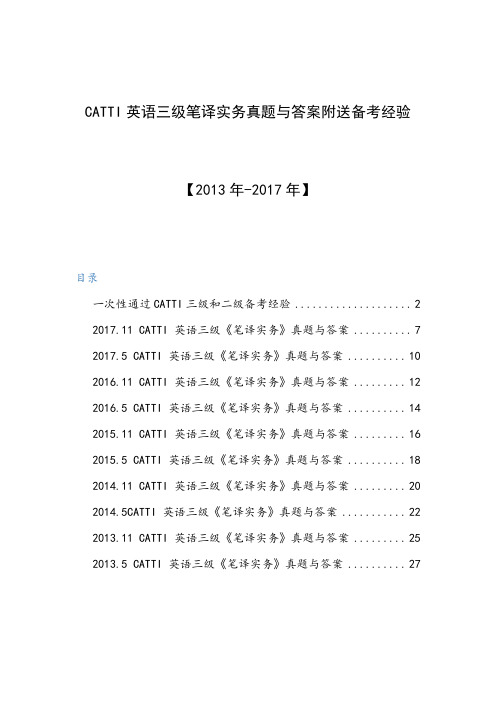
CATTI英语三级笔译实务真题与答案附送备考经验【2013年-2017年】目录一次性通过CATTI三级和二级备考经验 (2)2017.11 CATTI 英语三级《笔译实务》真题与答案 (7)2017.5 CATTI 英语三级《笔译实务》真题与答案 (10)2016.11 CATTI 英语三级《笔译实务》真题与答案 (12)2016.5 CATTI 英语三级《笔译实务》真题与答案 (14)2015.11 CATTI 英语三级《笔译实务》真题与答案 (16)2015.5 CATTI 英语三级《笔译实务》真题与答案 (18)2014.11 CATTI 英语三级《笔译实务》真题与答案 (20)2014.5CATTI 英语三级《笔译实务》真题与答案 (22)2013.11 CATTI 英语三级《笔译实务》真题与答案 (25)2013.5 CATTI 英语三级《笔译实务》真题与答案 (27)一次性通过CATTI三级和二级备考经验其实写下经验贴几个字有点忐忑,谈不上经验,就整理一下我这一学年的翻译之路吧,就算给自己做一个阶段总结~学习情况:大一过四六级,专四优秀(80),去年11月过三笔,今年5月过二笔。
考试感想:综合:可以看出我两次综合成绩都不高,大部分人都会上70,80+的也大有人在,所以我这个综合可以说是非常差了。
这里总结教训就是三个字:背单词!!!我之前是个不爱背单词的人,一般都凭着平时多看,然后看熟了自然就记住了,这种方法应对高考还有四六级什么的问题都不大,但是去年底考三笔的时候,我看着综合卷子真的欲哭无泪,选择题有几道中四个选项我一个都不认识,或者是眼熟但是搞不清意思,这就跟不认识是一样的。
所以去年底考完三笔我痛下决心,当天晚上就开始背单词。
背单词这事我是真的不喜欢,所以没有买单词书,因为我知道我买了肯定也不看,所以就下了APP背单词。
我曾经用过拓词,感觉界面很简洁,非常不错,后来开始用百词斩,算是比较有特色的APP,也还不错。
2013-2015年5月CATTI 英语三级笔译实务试题
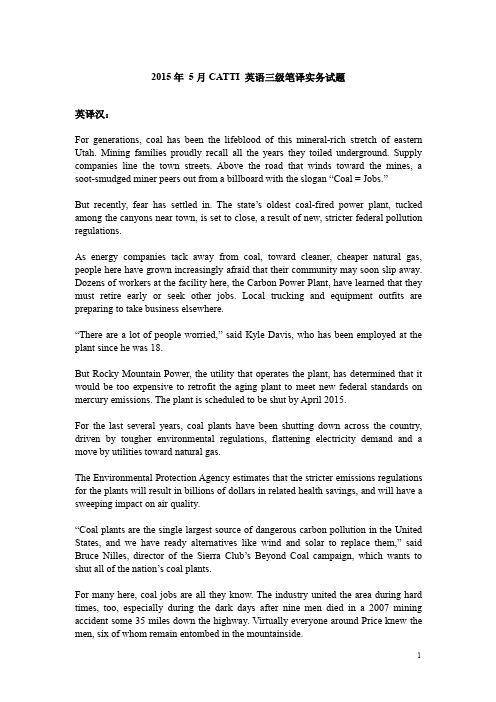
2015年5月CATTI英语三级笔译实务试题英译汉:For generations,coal has been the lifeblood of this mineral-rich stretch of eastern Utah.Mining families proudly recall all the years they toiled underground.Supply companies line the town streets.Above the road that winds toward the mines,a soot-smudged miner peers out from a billboard with the slogan“Coal=Jobs.”But recently,fear has settled in.The state’s oldest coal-fired power plant,tucked among the canyons near town,is set to close,a result of new,stricter federal pollution regulations.As energy companies tack away from coal,toward cleaner,cheaper natural gas, people here have grown increasingly afraid that their community may soon slip away. Dozens of workers at the facility here,the Carbon Power Plant,have learned that they must retire early or seek other jobs.Local trucking and equipment outfits are preparing to take business elsewhere.“There are a lot of people worried,”said Kyle Davis,who has been employed at the plant since he was18.But Rocky Mountain Power,the utility that operates the plant,has determined that it would be too expensive to retrofit the aging plant to meet new federal standards on mercury emissions.The plant is scheduled to be shut by April2015.For the last several years,coal plants have been shutting down across the country, driven by tougher environmental regulations,flattening electricity demand and a move by utilities toward natural gas.The Environmental Protection Agency estimates that the stricter emissions regulations for the plants will result in billions of dollars in related health savings,and will have a sweeping impact on air quality.“Coal plants are the single largest source of dangerous carbon pollution in the United States,and we have ready alternatives like wind and solar to replace them,”said Bruce Nilles,director of the Sierra Club’s Beyond Coal campaign,which wants to shut all of the nation’s coal plants.For many here,coal jobs are all they know.The industry united the area during hard times,too,especially during the dark days after nine men died in a2007mining accident some35miles down the highway.Virtually everyone around Price knew the men,six of whom remain entombed in the mountainside.But there is quiet acknowledgment that Carbon County will have to change—if not now,soon.Pete Palacios,who worked in the mines for43years,has seen coal roar and fade here. Now86,his eyes grew cloudy as he recalled his first mining job.He was12,and earned$1a day.“I’m retired,so I’ll be fine.But these young guys?”Pete Palacios said,his voice trailing off.汉译英:天柱县位于贵州省东部,是川渝黔通往两广、江浙的重要门户。
catti三级2013年5月真题

2013年5月三级笔译实务真题Section 1: English-Chinese Translation (英译汉)(50 points)文章来源:/2012/02/29/world/europe/spanish-village-in-debt-relies-on-volun teers.html?pagewanted=all&_r=0The Money Ran Out; Then the Villagers Stepped InHIGUERA DE LA SERENA, Spain — It didn’t take long for Manuel García Murillo, a bricklayer who took over as mayor here last June, to realize that his town was in trouble. It was 800,000 euros, a little more than $1 million, in the red. There was no cash on hand to pay for anything — and there was work that needed to be done.But then an amazing thing happened, he said. Just as the health department was about to close down the day care center because it didn’t have a proper kitchen, Bernardo Ben ítez, a construction worker, offered to put up the walls and the tiles free. Then, Maria Jos éCarmona, an adult education teacher, stepped in to clean the place up.And somehow, the volunteers just kept coming. Every Sunday now, the residents of this town in southwest Spain — young and old — do what needs to be done, whether it is cleaning the streets, raking the leaves, unclogging culverts or planting trees in the park.“It was an initiative from them,” said Mr. García. “Day to day we talked to people and we told them there was no money. Of course, they could see it. The grass in between the sidewalks was up to my thigh. “Higuera de la Serena is in many ways a microcosm of Spain’s troubles. Just as Spain’s national and regional governments are struggling with the collapse of the construction industry, overspending on huge capital projects and a pileup of unpaid bills, the same problems afflict many of its small towns.But what has brought Higuera de la Serena a measure of fame in Spain is that the residents have stepped up where their government has failed. Mr. García says his phone rings regularly from other town officials who want to know how to do the same thing. He is serving without pay, as are the town’s two other elected officials. They are also forgoing the cars and phones that usually come with the job.“We lived beyond our means,” Mr. García said. “We invested in public works that weren’t sensible. We are in technical bankruptcy.” Even some money from the European Union that was supposed to be used for routine operating expenses and last until 2013 has already been spent, he said.Higuera de la Serena, a cluster of about 900 houses surrounded by farmland, and traditionally dependent on pig farming and olives, got swept up in the giddy days of the construction boom. It built a cultural center and invested in a small nursing home. But the projects were plagued by delays and cost overruns.The cultural center still has no bathrooms. The nursing home, a whitewashed building sits on the edge of town, still unopened. Together, they account for some $470,000 of debt owed to the bank. But the rest of the debt is mostly the unpaid bills of a town that was not keeping up with its expenses. It owes for medical supplies, for diesel fuel, for road repair, for electrical work, for musicians who played during holidays.Higuera de la Serena is not completely without workers. It still has a half-time librarian, two half-time street cleaners, someone part-time for the sports complex, a secretary and an administrator, all of whom are paid through various financing streams apart from the town. But the town once had a work force twice the size. And when someone is ill, volunteers have to step in or the gym and sports complex — open four hours a day —must close.Section2: Chinese-English Translation (汉译英)(50 points)10年来,中国经济持续快速发展,经济实力、综合国力、人民生活水平迈上新的台阶,国家面貌发生举世瞩目的历史性变化,为促进亚洲和世界经济增长作出了重要贡献。
2013年5月翻译资格考试三级英语笔译真题及答案

2013年5月翻译资格考试三级英语笔译真题及答案试题部分:Section 1: English-Chinese Translation (英译汉) Translate the following passage into Chinese.It didn’t take long for Manuel García Murillo, a bricklayer who took over as mayor here last June, to realize that his town was in trouble. It was 800,000 euros, a little more than $1 million, in the red. There was no cash on hand to pay for anything — and there was work that needed to be done.But then an amazing thing happened, he said. Just as the health department was about to c lose down the day care center because it didn’t have a proper kitchen, Bernardo Benítez, a construction worker, offered to put up the walls and the tiles free. Then, Maria José Carmona, an adult education teacher, stepped in to clean the place up.And somehow, the volunteers just kept coming. Every Sunday now, the residents of this town in southwest Spain — young and old — do what needs to be done, whether it is cleaning the streets, raking the leaves, unclogging culverts or planting trees in the park.“I t was an initiative from them,” said Mr. García. “Day to day we talked to people and we told them there was no money. Of course, they could see it. The grass in between the sidewalks was up to my thigh. “Higuera de la Serena is in many ways a microcosm o f Spain’s troubles. Just as Spain’s national and regional governments are struggling with the collapse of the construction industry, overspending on huge capital projects and a pileup of unpaid bills, the same problems afflict many of its small towns.But what has brought Higuera de la Serena a measure of fame in Spain is that the residents have stepped up where their government has failed. Mr. García says his phone rings regularly from other town officials who want to know how to do the same thing. He is serving without pay, as are the town’s two other elected officials. They are also forgoing the cars and phones that usually come with the job.“We lived beyond our means,” Mr. García said. “We invested in public works that weren’t sensible. We are in technical bankruptcy.” Even some money from the European Union that was supposed to be used for routine operating expenses and last until 2013 has already been spent, he said.Higuera de la Serena, a cluster of about 900 houses surrounded by farmland, andtraditionally dependent on pig farming and olives, got swept up in the giddy days of the construction boom. It built a cultural center and invested in a small nursing home. But the projects were plagued by delays and cost overruns.The cultural center still has no bathrooms. The nursing home, a whitewashed building sits on the edge of town, still unopened. Together, they account for some $470,000 of debt owed to the bank. But the rest of the debt is mostly the unpaid bills of a town that was not keeping up with its expenses. It owes for medical supplies, for diesel fuel, for road repair, for electrical work, for musicians who played during holidays.Higuera de la Serena is not completely without workers. It still has a half-time librarian, two half-time street cleaners, someone part-time for the sports complex, a secretary and an administrator, all of whom are paid through various financing streams apart from the town. But the town once had a work force twice the size. And when someone is ill, volunteers have to step in or the gym and sports complex —open four hours a day — must close.Section 2: Chinese-English Translation (汉译英) Translate the following passage into English.10 年来,中国经济持续快速发展,经济实力、综合国力、人民生活水平迈上新的台阶,国家面貌发生举世瞩目的历史性变化,为促进亚洲和世界经济增长作出了重要贡献。
2013年5月英语三级笔译真题
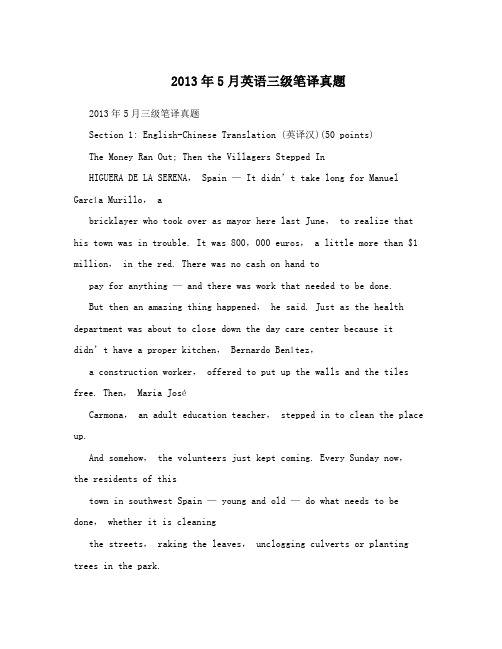
2013年5月英语三级笔译真题2013年5月三级笔译真题Section 1: English-Chinese Translation (英译汉)(50 points)The Money Ran Out; Then the Villagers Stepped InHIGUERA DE LA SERENA, Spain —It didn’t take long for Manuel García Murillo, abricklayer who took over as mayor here last June, to realize that his town was in trouble. It was 800,000 euros, a little more than $1 million, in the red. There was no cash on hand topay for anything — and there was work that needed to be done.But then an amazing thing happened, he said. Just as the health department was about to close down the day care center because it didn’t have a proper kitchen,Bernardo Benítez,a construction worker, offered to put up the walls and the tiles free. Then,Maria JoséCarmona, an adult education teacher, stepped in to clean the place up.And somehow, the volunteers just kept coming. Every Sunday now,the residents of thistown in southwest Spain — young and old — do what needs to be done, whether it is cleaningthe streets, raking the leaves, unclogging culverts or planting trees in the park.“It was an initiative from them,” said Mr. García. “Day to day we talked to people and wetold them there was no money. Of course, they could see it. The grass in between thesidewalks was up to my thigh. “Higuera de la Serena is in many ways a microcosm of Spain’s troubles. Just as Spain’snational and regional governments are struggling with the collapseof the construction industry, overspending on huge capital projects and a pileup of unpaid bills, the sameproblems afflict many of its small towns.But what has brought Higuera de la Serena a measure of fame in Spain is that the residents have stepped up where their government has failed. Mr. García says his phone rings regularly from other town officia ls who want to know how to do the same thing. He is serving without pay, as are the town’s two other elected officials. They are also forgoing the cars and phones that usually come with the job.“We lived beyond our means,” Mr. García said. “We invested i n public works that weren’tsensible. We are in technical bankruptcy.” Even some money from the European Union thatwas supposed to be used for routine operating expenses and lastuntil 2013 has already been spent, he said.Higuera de la Serena, a cluster of about 900 houses surrounded by farmland, andtraditionally dependent on pig farming and olives, got swept up in the giddy days of theconstruction boom. It built a cultural center and invested in a small nursing home. But the projects were plagued by delays and cost overruns.The cultural center still has no bathrooms. The nursing home, a whitewashed buildingsits on the edge of town, still unopened. Together, they account for some $470,000 of debtowed to the bank. But the rest of the debt is mostly the unpaidbills of a town that was not keeping up with its expenses. It owes for medical supplies, for diesel fuel, for road repair,for electrical work, for musicians who played during holidays.Higuera de la Serena is not completely without workers. It still has a half-time librarian, twohalf-time street cleaners, someone part-time for the sports complex, a secretary and anadministrator, all of whom are paid through various financing streams apart from the town. But the town once had a work force twice the size. And when someone is ill, volunteers haveto step in or the gym and sports complex — open four hours a day —must close.Section2: Chinese-English Translation (汉译英)(50 points),,年来,中国经济持续快速发展,经济实力、综合国力、人民生活水平迈上新的台阶,国家面貌发生举世瞩目的历史性变化,为促进亚洲和世界经济增长作出了重要贡献。
2013年CATTI三级笔译实务

2013年11月三级笔译实务真题Section 1: English-Chinese Translation (50points)Stroll through the farmers’ market and you will heara plethora of languages and see a rainbow offaces. Drive down Canyon Road and stop for halalmeat or Filipino pork b elly at adjacent markets.Along the highway, browse the aisles of a giant Asian super market stocking fresh napa cabbageand mizuna or fresh kimchi. Head toward downto wn and you’ll see loncheras — taco trucks —on street corners and hear Spanish banda music. On the city’s northern edge, you can sample Indian chaat.Welcome to Beaverton, a Portland suburb that is home to Oregon’s fastest growing im migrant population. Once a rural community, Beaverton, population 87,000, is no w the sixth largestcity in Oregon — with immigration rates higher than those of Portla nd, Oregon’s largest city.Best known as the world headquarters for athletic shoe company Nike, Beaverton ha s changeddramatically over the past 40 years. Settled by immigrants from northern E urope in the 19thcentury, today it is a place where 80 languages from Albanian to Urd u are spoken in the publicschools and about 30 percent of students speak a language besides English, according toEnglish as a Second Language program director Wei Wei Lou.Beaverton’s wave of new residents began arriving in the 1960s, with Koreans and Tej anos(Texans of Mexican origin), who were the first permanent Latinos. In 1960, Bea verton’s population of Latinos and Asians was less than 0.3 percent. By 2000, Beaver ton hadproportionately more Asian and Hispanic residents than the Portland metro are a. Today, Asianscomprise 10 percent and Hispanics 11 percent of Beaverton’s popula tion.Mayor Denny Doyle says that many in Beaverton view the immigrants who are rapidly reshapingBeaverton as a source of enrichment.“Citizens here especially in the arts and culture community think it’s fantastic that w e have all these different possibilities here,” he says.Gloria Vargas,50, a Salvadoran immigrant, owns a popular small restaurant, Gloria’s SecretCafé, in downtown Beaverton. “I love Beaverton,” she says.“I feel like I belong here.” Hermother moved her to Los Angeles as a teenager in 1973 , and she moved Oregon in 1979. Shelanded a coveted vendor spot in the Beaverton Farmers Market in 1999. Now in addition torunning her restaurant, she has one of th e most popular stalls there, selling up to 200Salvadoran tamales — wrapped in bana na leaves rather than corn husks — each Saturday.“Once they buy my food, they always come back for more,” she says.“It’s pretty relaxed here,” says Taj Suleyman,28, born and raised in Lebanon, and recentlytransplanted to Beaverton to start a job working with immigrants from many countries. HalfMiddle Eastern and half African, Suleyman says he was attracted to Beaverton specificallybecause of its diversity. He se rves on a city-sponsored Diversity Task Force set up by MayorDoyle.Mohammed Haque, originally from Bangladesh, finds Beaverton very welcoming. His d aughter,he boasts, was even elected her high school’s homecoming queen.South Asians such as Haque have transformed Bethany, a neighborhood north of Be averton.It is dense with immigrants from Gujarat, a state in India and primary sourc e for the first waveof Beaverton’s South Asian immigrants.The first wave of South Asian immigrants to Beaverton, mostly Gujaratis from India, a rrived inthe 1960s and 1970s, when the motel and hotel industry was booming. Many bought smallhotels and originally settled in Portland, and then relocated to Beaverton for better schools andbigger yards. The second wave of South Asians arrived during t he high-tech boom of the1980s, when the software industry, and Intel and Tektronix, really took off.Many of Beaverton’s Asians converge at Uwajimaya, a 30,000-square-foot supermar ket nearcentral Beaverton. Bernie Capell, former special events coordinator at Uwajim aya, says thatmany come to shop for fresh produce every day. But the biggest group of shoppers atUwajimaya, she adds, are Caucasians.Beaverton’s Asian population boasts a sizable number of Koreans, who began to arri ve in thelate 1960s and early 1970s.According to Ted Chung, a native of Korea and Beaverton resident since 1978, three t hingsstand out about his fellow Korean immigrants. Upon moving to Beaverton, they j oin a Christianchurch — often Methodist or Presbyterian — as a gathering place; they push their children to excel in school; and they shun the spotlight.Chung says he and his fellow Korean émigrés work hard as small businessmen — own inggroceries, dry cleaners, laundromats, delis, and sushi shops — and are frugal so t hey can sendtheir children to a leading university.Most recently, immigrants from Central and South America, as well as refugees from I raq andSomalia, have joined the Beaverton community.Many Beaverton organizations help immigrants.The Beaverton Resource Center helps all immigrants with health and literacy services . TheSomali Family Education Center helps Somalis and other African refugees to get settled. Andone Beaverton elementary school even came up with the idea of a “sew in”— parents ofstudents sewing together — to welcome Somali Bantu parents and bri dge major culturaldifferences.Historically white churches, such as Beaverton First United Methodist Church, offer im migrationministries. And Beaverton churches of all denominations host Korean- or Spa nish-languageservices.Beaverton’s Mayor Doyle wants refugee and immigrant leaders to participate in the t own’s decision-making. He set up a Diversity Task Force whose mission is “to build in clusive andequitable communities in the City of Beaverton.” The task force is working to create amulticultural community center for Beavertonians of all backgrounds.The resources and warm welcome that Beaverton gives immigrants are reciprocated in the affection that many express for their new home.Kaltun Caynan,40, a Somali woman who came to Beaverton in 2001 fleeing civil war, is anoutreach c oordinator for the Somali Family Education Center.“I like it so much,” she said,cheerfully.“Nobody discriminate[s against] me, everybody smiling at me.”2013年5月三级笔译实务真题Section 1: English-Chinese Translation (50points)It didn’t take long for Manuel García Murillo, a bricklayer who took over as mayor her e last June,to realize that his town was in trouble. It was800,000 euros, a little more t han $1 million, in thered. There was no cash on hand to pay for anything — and there was work that needed to bedone.But then an amazing thing happened, he said. Just as the health department was abo ut toclose down the day care center because it didn’t have a proper kitchen, Bernard o Benítez, a construction worker, offered to put up the walls and the tiles free. Then, Maria José Carmona,an adult education teacher, stepped in to clean the place up. And somehow, the volunteers just kept coming. Every Sunday now, the residents of t his townin southwest Spain — young and old — do what needs to be done, whether it is cleaning thestreets, raking the leaves, unclogging culverts or planting trees in the p ark.“It was an initiative from them,” said Mr. García.“Day to day we talked to people and we toldthem there was no money. Of course, the y could see it. The grass in between the sidewalks wasup to my thigh. “Higuera de la Serena is in many ways a microcosm of Spain’s troubles. Just as Spain’s nationaland regional governments are struggling with the collapse of the constructi on industry,overspending on huge capital projects and a pileup of unpaid bills, the sa me problems afflict many of its small towns.But what has brought Higuera de la Serena a measure of fame in Spain is that the re sidentshave stepped up where their government has failed. Mr. García says his phone rings regularlyfrom other town officials who want to know how to do the same thing. He is serving withoutpay, as are the town’s two other elected officials. They are also f orgoing the cars and phonesthat usually come with the job.“We lived beyond our means,” Mr. García said.“We invested in public works that weren’t sensible. We are in technical bankruptcy.” Even some money from the European Union thatwas supposed to be used for routin e operating expenses and last until 2013 has already beenspent, he said.Higuera de la Serena, a cluster of about 900 houses surrounded by farmland, and trad itionally dependent on pig farming and olives, got swept up in the giddy days of the constructionboom. It built a cultural center and invested in a small nursing home. Bu t the projects wereplagued by delays and cost overruns.The cultural center still has no bathrooms. The nursing home, a whitewashed building sits onthe edge of town, still unopened. Together, they account for some $470,000 of debt owed tothe bank. But the rest of the debt is mostly the unpaid bills of a town tha t was not keeping upwith its expenses. It owes for medical supplies, for diesel fuel, for road repair, for electricalwork, for musicians who played during holidays.Higuera de la Serena is not completely without workers. It still has a half-time libraria n, two half-time street cleaners, someone part-time for the sports complex, a secret ary and an administrator, all of whom are paid through various financing streams a part from the town.But the town once had a work force twice the size. And when som eone is ill, volunteers have tostep in or the gym and sports complex— open four hou rs a day — must close.Section 2: Chinese-English Translation (50 points)10年来,中国经济持续快速发展,经济实力、综合国力、人民生活水平迈上新的台阶,国家面貌发生举世瞩目的历史性变化,为促进亚洲和世界经济增长作出了重要贡献。
CATTI三级笔译综合能力训练真题
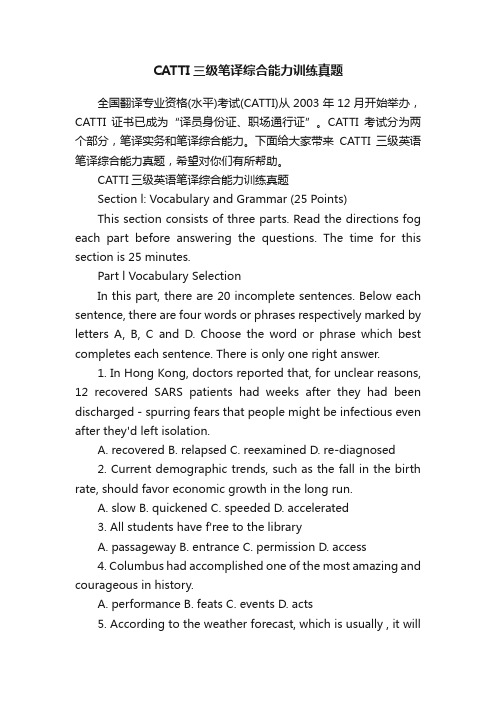
CATTI三级笔译综合能力训练真题全国翻译专业资格(水平)考试(CATTI)从2003年12月开始举办,CATTI证书已成为“译员身份证、职场通行证”。
CATTI考试分为两个部分,笔译实务和笔译综合能力。
下面给大家带来CATTI三级英语笔译综合能力真题,希望对你们有所帮助。
CATTI三级英语笔译综合能力训练真题Section l: Vocabulary and Grammar (25 Points)This section consists of three parts. Read the directions fog each part before answering the questions. The time for this section is 25 minutes.Part l Vocabulary SelectionIn this part, there are 20 incomplete sentences. Below each sentence, there are four words or phrases respectively marked by letters A, B, C and D. Choose the word or phrase which best completes each sentence. There is only one right answer.1. In Hong Kong, doctors reported that, for unclear reasons, 12 recovered SARS patients had weeks after they had been discharged - spurring fears that people might be infectious even after they'd left isolation.A. recoveredB. relapsedC. reexaminedD. re-diagnosed2. Current demographic trends, such as the fall in the birth rate, should favor economic growth in the long run.A. slowB. quickenedC. speededD. accelerated3. All students have f'ree to the libraryA. passagewayB. entranceC. permissionD. access4. Columbus had accomplished one of the most amazing and courageous in history.A. performanceB. featsC. eventsD. acts5. According to the weather forecast, which is usually , it willsnow this afternoon.A. exactB. preciseC. perfectD. accurate6. The janitor's long service with the company was a present.A. confirmed byB. recorded withC. appreciated byD. acknowledged with7. What they never take into account is the frazzled woman who is leading a life - trying to be a good mother while having to pretend at work that she doesn't have kids at all.A. doubleB. hardC. two-wayD. miserable8. Until the final votes are cast, though, assurances for nothing.A. countB. meantC. giveD. account9. Some philosophers insist that one way to knowledge is through an empirical approach.A. disseminateB. classifyC. testD. acquire10. If you think her experience is , we will employ her.A. sustainableB. adequateC. strongD. positive11. The trouble is that not many students really know how to make use of their time to its best .A. benefitB. advantageC. valueD. profit12. Readers , happy endings may find the unvarnished view of modern motherhood a bit unsettling.A. fondB. preferredC. adapted toD. accustomed to13. The explorer told the boys about his in the African forests.A. storiesB. voyageC. adventuresD. trips14. We were working time to get everything ready for the exhibition.A. againstB. inC. onD. ahead15. He drove fast and arrived an hour schedule.A. in advanceB. beforeC. byD. ahead of16. If you hear the fire , leave the building quickly.A. warningB. alarmC. signalD.bell17. The troops have been on the for a possible enemy attack.A. alarmB. alertC. warningD. notice18. Although his people did not his efforts, he kept trying.A. agree withB. apply toC. approve ofD. consent with19. Picasso's ability was apparent in his early youth when he started drawing sketches.A. writingB. artisticC. reasoningD. literary20. We hope that the measures to control prices, taken by the government, will succeed.A. whenB. sinceC. afterD. asPart 2 Vocabulary replacementThis part consists of 15 sentences in which one word or phrase is underline. Below each sentence, there four choices respectively rnarked by letters A, B, C and D. You are to select the ONE choice that can replace the underlined word without causing any grammatical error or changing the principal rneaning of the sentence. There is only one right answer.21. She bustled about with an assumption of authority.A. airB.suppositionC. appearanceD. face22. Table tennis is easy to learn, and, by the same token, boys don't need a lot of space to practice it.A. by the same ruleB. symbolicallyC. moreoverD. by logic23. The old man sat before the fire in a trance, thinking of his past life.A. in a special positionB. in a cozy stateC. in a sleepy stateD. in a meditative state24. Only the elite of society attended the reception for the new governor.A. those thought of as the best peopleB. the intellectualsC. the white-collar peopleD. the officials25. She embellished the simple dress with colorful embroidery.A. madeB. decoratedC. sewedD.improved26. He felt cheap about rushing to get in line before the old lady carrying heavy parcels.A. felt inferior and ashamedB. felt not worthwhile of doing somethingC. felt bad about doing somethingD. felt unhappy about doing something27. Only individual benefactors and ad hoc grants have made possible the ecological surveys already undertaken.A. additionalB. governmentalC. specialD. organizational28. The dichotomy postulated by many between morality and interests, between idealism and realism, is one of the standard cliches of the ongoing debate over international affairs.A. division into two partsB. combination of two partsC. disparityD. contradiction29. Miguel's perplexity is understandable - he's an all-purpose maintenance man at a mid- town-Manhattan residential building.A. all outB. versatileC. prolificD. capable30. Take the stalemate between the administration and the oil companies for example.A. caseB. deadlockC. conflictD.contradiction31. The sense of mistrust is compounded by smaller annoyances that leave the families feeling as though no one in authority cares about them.A. offsetB. intensifiedC. diminishedD. annulled32. The very ubiquity of electronic communications can havea surprising downside, notes Richard Kohn, a military historian at the University of North Carolina: a wife becomes accustomed to frequent e-mail from her husband, until he can't get to a computer. And then her anxiety increases.A. failureB. undersideC. drawbackD. consequence33. The President took a drubbing from much of the press which had breathlessly reported that a deal was in the bag.A. was sure to be madeB. was being consideredC. was their secret weaponD. was their last resort34. This reflects the priority being attached to economic over political activity, partly caused by a growing reluctance to enter a calling blighted by relentless publicity that all too often ends in destroying careers and reputation.A. divine summonsB. political careerC. professionD. business transaction35. If you can't dig into the field you have chosen for your pursuit, it is hardly possible for you toachieve anything significant in the field.A. acquireB. requireC. accompanyD. accomplishPart 3 Correcting Grammatical ErrorsThis part consists of 15 sentences in which is an underlined part that indicates a grammatical error. Below each sentence, there are four choices respectively marked by letters A, B, C and D. You are to select the ONE choice and replace the underlined element(s) so that the error is erased and corrected.There is only one right answer.36. Just last week, for example, the World Health Organization (WHO) announced the disturbing disclosure that SARS may be pretty deadlier than previously believed.A. veryB. farC. especiallyD. none37. What distinguished her in the other girls was her peculiar hairstyle.A. toB. fromC. thanD. with38. During many sectors are foundering, the $21 billion videogame-software industry is booming, adding game developers at a rate of 2,500 a year in the United States alone.A. WhenB. WhereasC. WouldD. While39. No such weapons were used and none been found.A. none have beenB. none hasC. no other has beenD. no others been40. No thing fuels cynicism for watching two titanic institutions squabble over their reputations.A. No ... asB. Something ... likeC. Nothing ... likeD. No ... than41. I see four kinds of pressure working on college students today: economic pressure, parental pressure, peer pressure, but self-induced pressure.A. andB. orC. nilD. with42. The sales manager of the company suggested more money is to spent in a more effective advertising campaign and better packaging design.A. is spending onB. will be spent inC. will be spent onD. be spent on43. According to some scientists, the computer will do ruuch harm to people's health as smoking and drugs do.A. does much harm ... smokingB. will do as much harm ... cigarettesC. will be doing as much harm ... smokingD. does as much harm ... cigarettes44. The general manager demanded the job will becompleted before the National Day.A. would be completedB. must be completedC. had to be completedD. be completed45. In his speech at the conference, the Chairman solemnly stated that the responsibility to our lives and the kind of world in that we live is ours and ours alone.A. for ... in whichB. of ... for whichC. of ... in whichD. for ... on which46. I knew nothing of the motives behind his recent move, and I don't know either the person to put him up to the action.A. nor did I know ... whoB. not did I know ... thatC. nor do I know ... thatD. either did I know ... who47. The achievements of the greatest minds in science could never have been reached if it had not been for the patient and accurate work of hundreds of other people.A. has it not beenB. if it had beenC. if hasn't beenD. had it not been48. The government has hardly taken measures to crack down on these crimes when new ones occurred.A. Hardly had the government takenB. The government had hardly takenC. Hardly the government had takenD. The government is hardly taking49. I can still vividly remember to pick our steps in the mountain down the deep valley on my21st birthday.A. picking ... in the mountainsB. picking ... on the mountainC. having picked ... from the mountainsD. picking ... from the mountains50. The traffic police stopped three trucks heavily loading with merchandise that looked as grain bags.A. that were loading ... likeB. loaded with ... likeC. to load with ... forD. loaded with ... forSection 2: Reading Comprehension (25 Points)In this section you will find after each of the passages a number of questions or unfinished statements about the passage, each with four (A, B, C and D) suggested answers or ways of finishing. You must choose the one which you think fits best.Questions 51-56 are based on the following passage.As viewed from space, the Earth's distinguishing characteristics are its blue waters and whit.e clouds. Enveloped by an ocean of air consisting of 78% nitrogen and 21% oxygen, the planet is the only one in our solar system known to harbor life. Circling the Sun at an average distance of 149 million km (93 million miles), the Earth is the third planet from the Sun and the fifth largest planet in the solar system. Its rapid spin and molten nickel-iron core give rise to an extensive magnetic field which, coupled with the atmosphere, shields us from nearly ail of the harmful radiation coming from the Sun and other stars. Most meteors burn up in the Earth's atmosphere before they can strike the surface. The planet's active geological processes have left no evidence of the ancient pelting it almost certainly received soon after it was formed. The Earth has a single natural satellite - the Moon.51. Approximately how much of the Earth's atmosphere is nitrogen?A. One-fourth.B. One- half.C. Three-fourths.D. All of it.52. Which of the following helps to create the Earth's magnetic fields?A. Its blue waters.B. Its nitrogen atmosphere.C. Its molten metal core.D. The Moon.53. What two factors help protect the Earth from radiation?A. Magnetic field and atmosphere.B. Rapid spin and molten iron-nickel core.C. The Sun and the Moon.D. Blue waters and white clouds.54. Why does the Earth show almost no signs of having been hit by numerous meteors in the past?A. Humans have built over most of the craters.B. Most meteors fell into the ocean and not on land.C. The Earth's magnetic field repelled most meteors.D. The Earth's natural geologic activity has eliminated most traces.55. The main idea of this passage is that .A. there are life-supporting characteristics on the EarthB. the Earth is predominantly waterC. the Earth has no common characteristics with other planetsD. the Earth is the only planet with a moon56. This selection leads one to believe that the Earth .A. never gets hit by meteorsB. always gets hit by meteorsC. was hit by meteors some time in the pastD. may be bombarded by meteors in the near futureQuestions 57-62 are based on the following passage.Since life began eons ago, thousands of creatures have come and gone. Some, such as the dinosaurs, became extinct due to naturally changing ecologic conditions. More recent threats to life forms are humans and their activities. Man has drained marshes, burned prairies, dammed and diverted rivers. Some of the more recent casualties of man's expansion have been the dodo, great auk, passenger pigeon, Irish elk, and Steller's sea cow.Sadly, we can no longer attribute the increasing decline in our wild animals and plant species to "natural" processes. Many species are dying out because of exploitation, habitat alteration or destruction, pollution, or the introduction of new species of plants and animals to an area. As mandated by Congress, protecting endangered species, and restoring them to the point where their existence is no longerjeopardized, is the primary objective of the U.S. Fish and MriZdlife Service's Endangered Species Program.57. Which of the following is a form of man's habitat alteration?A. Glacial encroachment.B. Hurricanes.C. Dammed rivers.D. Snowstorms.58. Which of the following has become extinct due to man's destruction?A. African elephant.B. Irish elk.C. Giant panda.D. White Bengal.59. Which of the following would be a likely theme for the next paragraph?A. Naturally changing ecological conditions.B. Animals that have become extinct.C. Achievements of the government Endangered Species Program.D. Programs that have destroyed natural habitats.60. The tone of the passage is .A. nationalisticB. pro-wildlifeC. anti-wildlifeD. feminist61. According to this passage, .A. man is the cause of some animal extinctionB. animals often bring about their own extinctionC. Congress can absolutely end extinction of animalsD. a law is more important than human responsibility62. Which of the following is NOT a cause of increasing decline of wild animal population?A. Exploitation.B. Pollution.C. Habitat alteration.D. Congressional Law.Questions 63-68 are based on the following passage.The "Karat" marking on jewelry tells you what proportion of-gold is mixed with other metals. If 14 parts of gold are mixed with 10 parts of base metal, the combination is called 14- Karat (14K) gold. The higher the Karat ratings the higher the proportion of gold in the object. The lowest Karat gold that can be marketed in the United States is 10-Karat gold. Jewelry does not have to be marked with its Karat quality, but most of it is. If there is a Karat quality mark, next to it must be the U.S. registered trademark of the person or company that will stand behind the mark, as required by the National Gold and Silver Stamping Act.63. If a ring is stamped 24K, it has .A. 204 parts of goldB. 24 parts of goldC. two and four-tenths parts of goldD. 10 parts of gold64. Gold which is 10 Karats in proportion in the U.S.A. represents the highest grade of goldB. cannot be soldC. never carries a Karat quality markD. represents the lowest-grade gold marketable65. If gold is marked with a Karat quality mark, it must also bear .A. a national gold and silver stampB. the registered trademark of the entity standing behind the markC. a "made in the USA" markD. a percentage mark66. If the jewelry is marked 14 parts of gold mixed with l0 parts of base metal, it will always bear mark.A. a 14KB. a 10KC. an 18KD. a platinum67. This paragraph serves the consumer as .A. important buying informationB. a challenge to buy more goldC. a debate over gold pricesD. advice about buying silver68. The Stamping Act is .A. a regulation for taxB. rule of lawC. a law that makes such stamping mandateD. an implementQuestions 69-75 are based on the following passage.Mr. Faugel was convinced that student nervousness had affected their scores; to reduce the anxiety of these students who had already been tested, he gave 22 0f them a beta blocker before re-administration of the test. Their scores improved significantly. The other 8 students (who did not receive the beta blockers) improved only slightly. Second-time test-takers nation wide had average improvements which were similar to those in Faugel's non-beta blocker group. Beta blockers are prescription drugs which have been around for 25 years. These medications, which interfere with the effects of adrenalin, have been used for heart conditions and for minor stress such as stage fright. Now they are used for test anxiety. These drugs seem to help test-takers who have low scores because of test fright, but not those who do not know the material. Since there can be side effects from these beta blockers, physicians are not ready to prescribe them routinely for all test-takers.69. Where is the only place a person can obtain beta blockers?A. Supermarket.B. Convenience store.C. Stationary storeD.Doctor's office70. Why are beta blockers not prescribed regularly?A. Students are expected to do poorly.B. There are side effects.C. The drugs are only 25 years old.D. They cause test anxiety.71. According to the passage,______ .A. all people can take beta blockersB. beta blockers are widely prescribedC. beta blockers work only on test anxietyD. beta blockers work only to improve test scores if the test-taker truly knows the material72. "Re_administration" in this passage refers to giving .A. the test again to people without administering beta blockersB. the test again to both groups after beta blockers have been administered to one groupC. the test to both groups of test-takers and then giving them beta blockersD. the beta blockers without retesting73. What possible use for betdi i,lockers was NOT discussed in this passage?A. Test anxiety.B. Pain relief.C. Minor stress.D. Heart conditions.74. Beta blockers work on some physical and emotional symptoms because they .A. fool a person into a healthier stanceB. interfere with the effects of adrenalinC. produce side effects worse than the symptomsD. primarily change human thought processes75. Faugel's research showed that beta blockers given to hissample .A. increased scores less than the national averageB. increased scores the same as the national averageC. decreased scoresD. increased scores much more than the national averageSection 3: Cloze Test (20 Points)In the following passage, there are 20 blanks representing words that are missing from the context. You are to provide each. of the blanks with the missing word. The time for this section is 20 minutes.When I tell people that I'm a professor of communication, they often are confused (1)what the term "communication" means. Many people think mass communication is the (2) type of communication, but mass communication is only one form of communication. The study of mass communication focuses on messages that are (3) over (4) such as television, newspapers, and radio. Other areas of (5) focus on the messages individuals send to one another. Some of the major contexts in which communication is studied (6) the interpersonal context, the organizational context, and the intercultural context. A scholar studying (7) communication, for example, might examine how married couples (8) with misunderstandings and the effects these misunderstandings have on (9) satisfaction. Organizational communication scholars, on the other hand, might study (10) the communication styles used by managers and their subordinates influence efficiency in a company or factory.My area of specialization is intercultural communication. Intercultural communication is an (11) field of study which incorporates research from disciplines (12) as social psychology, sociology, cultural anthropology, sociolinguistics, and of course,communication. One of the (13) important areas of research addressed by intercultural scholars is how misunderstandings can be (14) when people communicate with others from different (15). To understand the process of intercultural communication, we must study how individuals' cultural backgrounds (16) their communication behaviors.The area of intercultural communication is a relatively new (17) of study even in the United States. While most Chinese students studying communication in the United States (18) on mass communication, there are some who are interested in intercultural communication and plan to return to China to teach and (19) research in this area. The work of these Chinese scholars on intercultural communication is important because it will help improve (20) between Chinese and Americans in the future.Section 4: Writing (30 Points)In the first paragraph, you should start with. your general statement, followed with your arguments in the second paragraph. You should conclude your writing in the third para graph, with suggestions or ideas of your own,. Marks will be given to (1) clear overall views of subjects, (2) original ideas and clear idea organization, (3) passage cohesion and smooth language flow, (4) accurate use of words and grammar. The time for this part is 30 minutes.Instruction:Write an essay in around 300 English words on the following subject:What are, in your opinion, the 3 basic qualifications a good translator should have? Give your reasons. Your essay should consist of a lead-in paragraph, a concluding one and the body.参考答案:Section l (25分,每题 0.5分)Part 11-5 BDDBD 6-10 DAADB 11-15 BDCAD 16-20 BBCBDPart 221-25 ACDAB 26- 30 ACABB 30-31 BCACDPart 336-40 BBDAC 41-45 ADBDA 46-50 ADADBSection 2 (25分,每题 1分)51-55 CCADC 56-60 CCBCB 61-65 ADBDB66-70 AACDB 71-75 DBBBDSection 3 (20分,每空1分)1. about2. only3. transmitted4. mass media5. communication6. include7. interpersonal8. deal/cope9. marital 10. how11. interdisciplinary 12. such 13. most 14. minimized 15. cultures16. influence/affect 17. field 18. focus/concentrate 19. conduct/do 20. understandingSection 4 (30分)略。
全国翻译资格考试三级笔译实务历年真题汉译英分级译文解码(简化版)
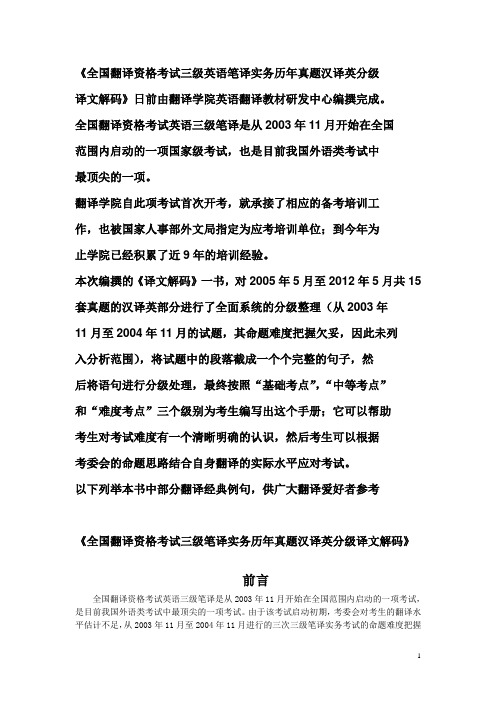
《全国翻译资格考试三级英语笔译实务历年真题汉译英分级译文解码》日前由翻译学院英语翻译教材研发中心编撰完成。
全国翻译资格考试英语三级笔译是从2003年11月开始在全国范围内启动的一项国家级考试,也是目前我国外语类考试中最顶尖的一项。
翻译学院自此项考试首次开考,就承接了相应的备考培训工作,也被国家人事部外文局指定为应考培训单位;到今年为止学院已经积累了近9年的培训经验。
本次编撰的《译文解码》一书,对2005年5月至2012年5月共15 套真题的汉译英部分进行了全面系统的分级整理(从2003年11月至2004年11月的试题,其命题难度把握欠妥,因此未列入分析范围),将试题中的段落截成一个个完整的句子,然后将语句进行分级处理,最终按照“基础考点”,“中等考点”和“难度考点”三个级别为考生编写出这个手册;它可以帮助考生对考试难度有一个清晰明确的认识,然后考生可以根据考委会的命题思路结合自身翻译的实际水平应对考试。
以下列举本书中部分翻译经典例句,供广大翻译爱好者参考《全国翻译资格考试三级笔译实务历年真题汉译英分级译文解码》前言全国翻译资格考试英语三级笔译是从2003年11月开始在全国范围内启动的一项考试,是目前我国外语类考试中最顶尖的一项考试。
由于该考试启动初期,考委会对考生的翻译水平估计不足,从2003年11月至2004年11月进行的三次三级笔译实务考试的命题难度把握欠妥。
因此,我们在整理历年真题时将这三次的试题没有列在我们的试题分析范围内。
我们从2005年5月至2012年5月共15套真题的汉译英部分进行了全面系统的分级整理,将试题中的段落截成一个个完整的语句,然后将句子进行分级处理,最终按照“基础考点”,“中等考点”和“难度考点”三个级别为考生编写出这个手册--《全国翻译资格考试三级笔译实务历年真题汉译英分级译文解码》。
这个手册可以使考生对考试的难度有一个比较清晰明确的认识。
这样,我们的考生就可以根据考委会命题的思路与难度的要求做到心中有数并根据自身翻译的实际水平应对考试。
CATTI三级笔译综合能力真题和答案与解析
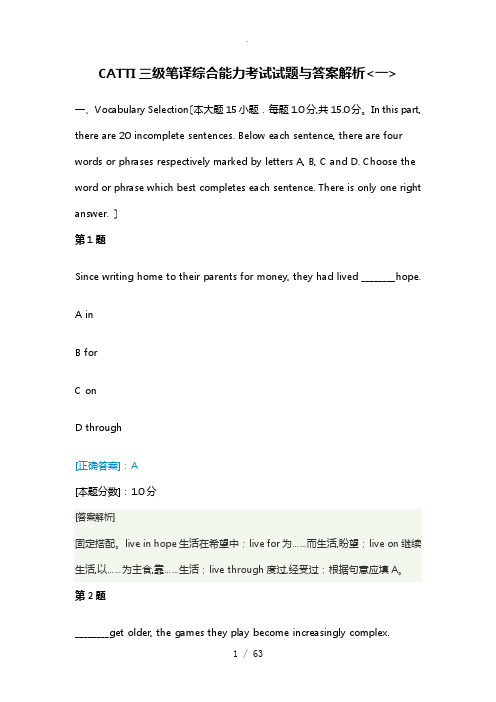
CATTI三级笔译综合能力考试试题与答案解析<一>一、Vocabulary Selection〔本大题15小题.每题1.0分,共15.0分。
In this part, there are 20 incomplete sentences. Below each sentence, there are four words or phrases respectively marked by letters A, B, C and D. Choose the word or phrase which best completes each sentence. There is only one right answer. 〕第1题Since writing home to their parents for money, they had lived ________hope.A inB forC onD through[正确答案]:A[本题分数]:1.0分[答案解析]固定搭配。
live in hope生活在希望中;live for为……而生活,盼望;live on继续生活,以……为主食,靠……生活;live through度过,经受过;根据句意应填A。
第2题________get older, the games they play become increasingly complex.A ChildrenB Children, when theyC As childrenD For children to[正确答案]:C[本题分数]:1.0分[答案解析]语法应用。
本句逗号前是状语从句,空白处应填连词;主句主语是the games,因此选项A、B、D均不对;只有as"随着"符合句意,所以C为答案。
第3题Martin has created enough memorable ________to make it easy to forgive his lows.A youngstersB noblesC highsD miserables[正确答案]:C[本题分数]:1.0分[答案解析]固定搭配。
2013年11月翻译资格考试三级笔译真题

《三级笔译实务》1. 英译汉:Beaverton: Oregon’s Most Diverse CityStroll through the farmers’ market and you will hear a plethora(过多)of languages and see a rainbow of faces. Drive down Canyon Road and stop for halal meat or Filipino pork belly at adjacent markets. Along the highway, browse the aisles of a giant Asian supermarket stocking fresh napa cabbage and mizuna or fresh kimchi. Head toward downtown and you’ll see loncheras — taco trucks — on street corners and hear Spanish banda music. On the city’s northern edge, you can sample Indian chat.漫步农贸市场,你会听到各种声音,看到形象色色的面孔。
驾车行驶在卡农大街上,沿路停下来买些清真肉制品或在邻近的市场上买些菲律宾猪肚。
沿着高速公路行驶,逛逛巨大的亚裔超市,放眼望去,那些新鲜的小白菜,日本沙拉菜还有朝鲜的新鲜泡菜陈列铺展在你的眼前。
向市中心开去,你能在街角看到卖墨西哥煎玉米卷的塔克卡车,还能听到西班牙班达乐队的音乐。
在城市北部边缘,你能品尝到印度菜。
Welcome to Beaverton, a Portland suburb that is home to Oregon’s fastest growing immigrant population. Once a rural community, Beaverton, population 87,000, is now the sixth largest city in Oregon —with immigration rates higher than those of Portland, Ore gon’s largestcity.欢迎来到波特兰市郊的比弗顿!这里有着俄勒冈州增长最快的移民群体。
笔译三级考试题库及答案
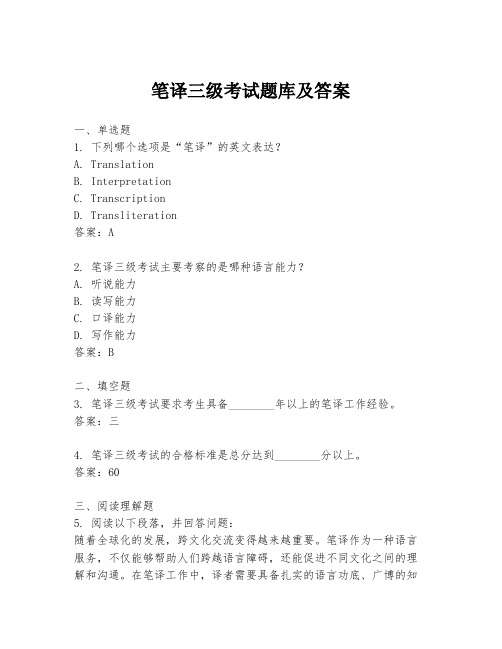
笔译三级考试题库及答案一、单选题1. 下列哪个选项是“笔译”的英文表达?A. TranslationB. InterpretationC. TranscriptionD. Transliteration答案:A2. 笔译三级考试主要考察的是哪种语言能力?A. 听说能力B. 读写能力C. 口译能力D. 写作能力答案:B二、填空题3. 笔译三级考试要求考生具备________年以上的笔译工作经验。
答案:三4. 笔译三级考试的合格标准是总分达到________分以上。
答案:60三、阅读理解题5. 阅读以下段落,并回答问题:随着全球化的发展,跨文化交流变得越来越重要。
笔译作为一种语言服务,不仅能够帮助人们跨越语言障碍,还能促进不同文化之间的理解和沟通。
在笔译工作中,译者需要具备扎实的语言功底、广博的知识面和敏锐的文化感知能力。
问题:笔译在跨文化交流中的作用是什么?答案:笔译能够帮助人们跨越语言障碍,促进不同文化之间的理解和沟通。
四、翻译题6. 将下列句子从中文翻译成英文:“随着互联网技术的发展,远程笔译工作变得越来越普遍。
”答案:"With the development of internet technology, remote translation work is becoming more and more common."7. 将下列句子从英文翻译成中文:"The role of a translator is to bridge the gap betweendifferent languages and cultures."答案:“翻译者的角色是架起不同语言和文化之间的桥梁。
”五、简答题8. 简述笔译三级考试的评分标准。
答案:笔译三级考试的评分标准主要包括译文的准确性、流畅性、完整性和专业性。
准确性要求译文忠实原文,无误译漏译;流畅性要求译文通顺自然,符合目标语言的表达习惯;完整性要求译文涵盖原文所有信息,无遗漏;专业性要求译文符合专业领域的特点和要求。
2013年5月CATTI翻译资格水平考试真题(回忆版)
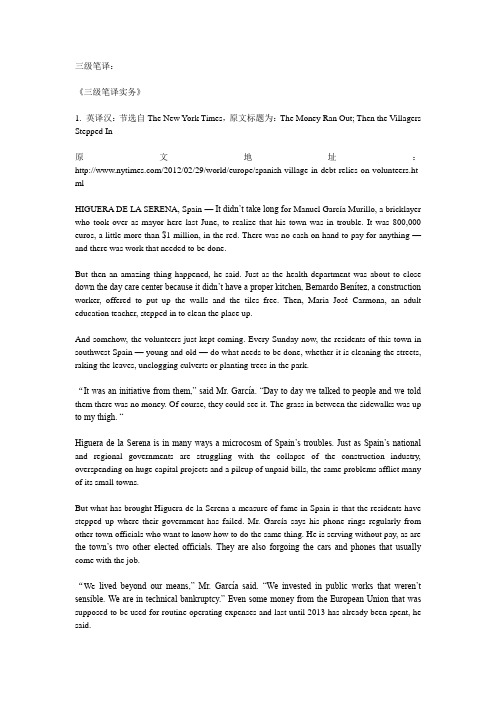
三级笔译:《三级笔译实务》1. 英译汉:节选自The New York Times,原文标题为:The Money Ran Out; Then the Villagers Stepped In原文地址:/2012/02/29/world/europe/spanish-village-in-debt-relies-on-volunteers.ht mlHIGUERA DE LA SERENA, Spain —It didn’t take long f or Manuel García Murillo, a bricklayer who took over as mayor here last June, to realize that his town was in trouble. It was 800,000 euros, a little more than $1 million, in the red. There was no cash on hand to pay for anything —and there was work that needed to be done.But then an amazing thing happened, he said. Just as the health department was about to close down the day care center because it didn’t have a proper kitchen, Bernardo Benítez, a construction worker, offered to put up the walls and the tiles free. Then, Maria JoséCarmona, an adult education teacher, stepped in to clean the place up.And somehow, the volunteers just kept coming. Every Sunday now, the residents of this town in southwest Spain — young and old — do what needs to be done, whether it is cleaning the streets, raking the leaves, unclogging culverts or planting trees in the park.“It was an initiative from them,” said Mr. García. “Day to day we talked to people and we told them there was no money. Of course, they could see it. The grass in between the sidewalks was up to my thigh. “Higuera de la Serena is in many ways a microcosm of Spain’s troubles. Just as Spain’s national and regional governments are struggling with the collapse of the construction industry, overspending on huge capital projects and a pileup of unpaid bills, the same problems afflict many of its small towns.But what has brought Higuera de la Serena a measure of fame in Spain is that the residents have stepped up where their government has failed. Mr. García says his phone rings regularly from other town officials who want to know how to do the same thing. He is serving without pay, as are the town’s two other elected officials. They are also forgoing the cars and phones that usually come with the job.“We lived beyond our means,” Mr. García said. “We invested in public works that weren’t sensible. We are in technical bankruptcy.” Even some money from the European Union that was supposed to be used for routine operating expenses and last until 2013 has already been spent, he said.Higuera de la Serena, a cluster of about 900 houses surrounded by farmland, and traditionally dependent on pig farming and olives, got swept up in the giddy days of the construction boom. It built a cultural center and invested in a small nursing home. But the projects were plagued by delays and cost overruns.The cultural center still has no bathrooms. The nursing home, a whitewashed building sits on the edge of town, still unopened. Together, they account for some $470,000 of debt owed to the bank. But the rest of the debt is mostly the unpaid bills of a town that was not keeping up with its expenses. It owes for medical supplies, for diesel fuel, for road repair, for electrical work, for musicians who played during holidays.Higuera de la Serena is not completely without workers. It still has a half-time librarian, two half-time street cleaners, someone part-time for the sports complex, a secretary and an administrator, all of whom are paid through various financing streams apart from the town. But the town once had a work force twice the size. And when someone is ill, volunteers have to step in or the gym and sports complex — open four hours a day — must close.2. 汉译英:节选自胡锦涛在博鳌亚洲论坛2011年会开幕式演讲>>>10年来,中国经济持续快速发展,经济实力、综合国力、人民生活水平迈上新的台阶,国家面貌发生举世瞩目的历史性变化,为促进亚洲和世界经济增长作出了重要贡献。
- 1、下载文档前请自行甄别文档内容的完整性,平台不提供额外的编辑、内容补充、找答案等附加服务。
- 2、"仅部分预览"的文档,不可在线预览部分如存在完整性等问题,可反馈申请退款(可完整预览的文档不适用该条件!)。
- 3、如文档侵犯您的权益,请联系客服反馈,我们会尽快为您处理(人工客服工作时间:9:00-18:30)。
Section 1: English-Chinese Translation (英译汉)(50 points) 文章来源:The New York Times
The Money Ran Out; Then the Villagers Stepped In
HIGUERA DE LA SERENA, Spain —It didn’t take long for Manuel Garc ía Murillo, a bricklayer who took over as mayor here last June, to realize that his town was in trouble. It was 800,000 euros, a little more than $1 million, in the red. There was no cash on hand to pay for anything —and there was work that needed to be done.
But then an amazing thing happened, he said. Just as the health department was about to close down the day care center because it didn’t have a proper kitchen, Bernardo Benítez, a construction worker, offered to put up the walls and the tiles free. Then, Maria José Carmona, an adult education teacher, stepped in to clean the place up.
And somehow, the volunteers just kept coming. Every Sunday now, the residents of this town in southwest Spain —young and old —do what needs to be done, whether it is cleaning the streets, raking the leaves, unclogging culverts or planting trees in the park.
“It was an initiative from them,”said Mr. García. “Day to day we talked to people and we told them there was no money. Of course, they could see it. The grass in between the sidewalks was up to my thigh. “
Higuera de la Serena is in many ways a microcosm of Spain’s troubles. Just as Spain’s national and regional governments are struggling with the collapse of the construction industry, overspending on huge capital projects and a pileup of unpaid bills, the same problems afflict many of its small towns.
But what has brought Higuera de la Serena a measure of fame in Spain is that the residents have stepped up where their government has failed. Mr. García says his phone rings regularly from other town officials who want to know how to do the same thing. He is serving without pay, as are the town’s two other elected officials. They are also forgoing the cars and phones that usually come with the job.
“We lived beyond our means,”Mr. García said. “We invested in public works that weren’t sensible. We are in technical bankruptcy.”Even some money from the European Union that was supposed to be used for routine operating expenses and last until 2013 has already been spent, he said.
Higuera de la Serena, a cluster of about 900 houses surrounded by farmland, and traditionally dependent on pig farming and olives, got swept up in the giddy days of the construction boom. It built a cultural center and invested in a small nursing home. But the projects were plagued by delays and cost overruns.
The cultural center still has no bathrooms. The nursing home, a whitewashed building sits on the edge of town, still unopened. Together, they account for some $470,000 of debt owed to the bank. But the rest of
the debt is mostly the unpaid bills of a town that was not keeping up with its expenses. It owes for medical supplies, for diesel fuel, for road repair, for electrical work, for musicians who played during holidays.
Higuera de la Serena is not completely without workers. It still has a half-time librarian, two half-time street cleaners, someone
part-time for the sports complex, a secretary and an administrator, all of whom are paid through various financing streams apart from the town. But the town once had a work force twice the size. And when someone is ill, volunteers have to step in or the gym and sports complex — open four hours a day — must close.
Section2: Chinese-English Translation (汉译英)(50 points)
10年来,中国经济持续快速发展,经济实力、综合国力、人民生活水平迈上新的台阶,国家面貌发生举世瞩目的历史性变化,为促进亚洲和世界经济增长作出了重要贡献。
中国虽然取得了举世瞩目的发展成就,但仍然是世界上最大的发展中国家,经济社会发展面临巨大的人口、资源、环境压力,发展中不平衡、不协调、不可持续问题依然突出。
2011年,中国开始实施国民经济和社会发展第十二个五年规划纲要,提出了今后5年中国经济社会发展的总体任务。
未来5年,中国将着力实施扩大内需特别是消费需求的战略,建立长效机制,释放消费潜力,着力促进经济增长向依靠消费、投资、出口协调拉动转变。
中国将着力实施“走出去”战略,引导各类所有制企业有序到境外投资,积极开展有利于改善当地基础设施和人民生活的项目合作。
中国将着力参与全球经济治理和区域合作,推动国际经济金融体系改革,推动建立均衡、普惠、共赢的多边贸易体制,反对各种形式的保护主义,促进国际经济秩序朝着更加公正合理的方向发展。
